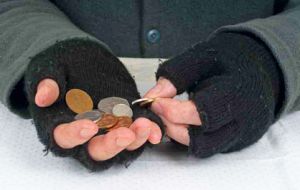MercoPress. South Atlantic News Agency
UK a most unequal country; 10% of population own over half of the wealth
 634,000 Britons were worth 20 times as much as the poorest 13 million. Oxfam has urged PM May to help close the gap between the “haves” and the “have-nots”.
634,000 Britons were worth 20 times as much as the poorest 13 million. Oxfam has urged PM May to help close the gap between the “haves” and the “have-nots”.  Oxfam's UK Program Rachael Orr said: “Inequality is a massive barrier to tackling poverty, creating an economy that clearly isn't working for everyone”.
Oxfam's UK Program Rachael Orr said: “Inequality is a massive barrier to tackling poverty, creating an economy that clearly isn't working for everyone”. The richest 1% of the UK population owns more than 20 times the wealth of the poorest fifth, according to Oxfam. That made Britain one of the most unequal countries in the developed world and contributed to the vote for Brexit, the charity said.
Its analysis found that about 634,000 Britons were worth 20 times as much as the poorest 13 million people. Oxfam has urged Prime Minister Theresa May to help close the gap between the “haves” and the “have-nots”.
The charity's report analyzed data from Credit Suisse and found that the richest 10% of the UK population own over half of the country's total wealth, with the top 1% owning nearly a quarter (23%). The poorest 20% share just 0.8% of the UK's wealth between them.
The report said many people in the UK felt locked out of politics and economic opportunity.
“Whatever your views on Brexit, the referendum brought divisions within our country to a head, with many people expressing distrust and disconnection with political processes and voting for change in the hope that it would improve their economic position,” Oxfam said.
The charity welcomed Mrs. Theresa May's recognition of the need to reform corporate culture and proposed a series of measures for the government to adopt.
They include: delivering on the Prime Minister's pledge to give workers more representation on companies' boards. Giving firms incentives to improve workers' skills and encouraging benefit claimants to undergo training and education. Adopt pay ratios of 20:1 so that the best-paid person at a company can earn no more than 20 times the salary of the lowest-paid worker. Tackling corporate tax avoidance and ending UK-linked tax havens.
Rachael Orr, head of Oxfam's UK Program, said: “Inequality is a massive barrier to tackling poverty and has created an economy that clearly isn't working for everyone. While executive pay soars, one in five people live below the poverty line and struggle to pay their bills and put food on the table.”
Ending unscrupulous practices must be a central element of the government's plans to reform the economy, she said.
“That means closing wage gaps, incentivizing investment in companies' staff and making sure they pay their fair share of taxes,” Ms Orr said.
A Downing Street spokesperson said the government had made changes such as bringing in the National Living Wage and reforming the welfare system, but admitted that more needed to be done to help both the poorest in the UK as well as families struggling to make ends meet (BBC)




Top Comments
Disclaimer & comment rules-

-

-

Read all commentsInteresting report. I read it last year when it came out.
Sep 13th, 2016 - 01:54 pm 0https://publications.credit-suisse.com/tasks/render/file/?fileID=F2425415-DCA7-80B8-EAD989AF9341D47E
If people think the UK comes out bad it absolutely trashes any notion of Aegentina advancing over the past 15 years.
Doesn't surprise me. Social mobility is also poor and both those things are pretty dire for any country.
Sep 13th, 2016 - 05:51 pm 0I came from a very poor family indeed but worked at school and to become a Chartered Engineer.
Sep 13th, 2016 - 06:13 pm 0You need intelligence and work smarter than anybody else AND: luck.
If I can do it, anybody with a brain can do it.
Commenting for this story is now closed.
If you have a Facebook account, become a fan and comment on our Facebook Page!